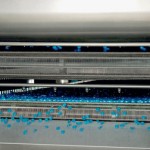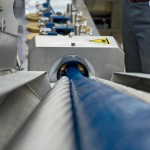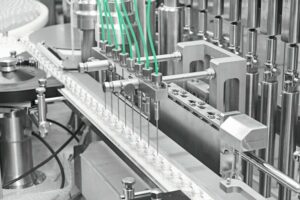Across Europe, the range of active ingredients licensed for use in products with health benefits has increased considerably in recent times. Such fortified products are typically marketed with the premise of inhibiting common diseases such as obesity, diabetes, cardiovascular complaints or cancer. Others are claimed to reduce the symptoms of ageing, enhance the immune system or have an antioxidant effect. In this context, concepts of prescription drugs incorporated in confectionery have a high market potential.
The concept of prescription drugs incorporated in confectionery – known as Sweet Medicine – is already developed. Sweets are used on the one hand to prevent diseases, while on the other hand they operate as a substantiated, recognised medical resource. Prime examples are active ingredients that can be employed to fortify confectionery products and subsequently consumed to combat sore throats, coughs or respiratory problems. The German company Bosch Technology Systems has a multidisciplinary background traversing both the confectionery and pharmaceutical sectors across the world, including experience in solid and liquid pharmaceutical packaging and much more. The company is ideally positioned to manufacture confectionery equipment that can also implement processes approved for pharmaceutical-grade ingredients. There is particular potential for products incorporating:
- Active pharmaceutical ingredients (APIs) which are released in the mouth or throat. Many APIs have an unpleasant taste that must be masked.
- Active substances that must be taken in a high dosage – it is more acceptable for the patient to take them, and far easier to swallow, as a special confectionery product (i.e. sweets for chewing).
- Convenience drugs that have to be consumed at specific time intervals, often away from home and without drinking water.
- Children’s medicine, as they are far more likely to eat or swallow a sweet than a tablet.
When transferring from a purely confectionery production environment to one dealing with pharmaceutical and other non-food ingredients, manufacturers must take into account certain considerations.
Dosing precision – one of the biggest challenges
In order to optimise the use of ingredients in the formulation, dosing of the active ingredients and mixing precision remain the biggest challenges. There is a low tolerance for dosing inaccuracies, as these may result in high-dosed or under-dosed products. It is also necessary to integrate mechanisms within the production line that undertake continuous, exact, inline control of manufacturing processes. These mechanisms should be sufficiently sensitive to immediately establish these non-conformances and execute the appropriate corrective procedures. It should be possible to achieve tolerances of less than 5% when using the correct technological mechanisms. The BKK continuous cooking machine for making hard sugar products, for example, measures the exact flow rate of the sugar batch and adapts the feed to the additives. An integrated, active, inline mixing unit assures uniform mixing of the mass by monitoring the speed, temperature and pressure.
In addition to the need for current GMP machinery certification and the low tolerance for dosing inaccuracies, it is essential to bear the following in mind:
- APIs have a defined effect spectrum and must be dosed accurately. This is medically regarded as the highest priority.
- APIs are considerably more expensive than confectionery ingredients, thus making a clear economical reason to guarantee optimal dosing precision and thereby minimise losses.
- The ingredients must be mixed sufficiently to ensure even distribution of the APIs throughout the Sweet Medicine confectionery product.
Quality management and automated cleaning processes
A key concern in the quality control arena are the blending and mixing capacities of a line, with the ultimate goal of ensuring maximum homogeneity for products like hard sweets or lozenges. Many products are well-known across the world and consumers would immediately notice if there was any obvious degree of variation. For example, Bosch lines for standard confectionery can be designed to operate with tolerances of 5 % or less, which is certainly within the specification for Sweet Medicine containing APIs.
Many Bosch lines for confectionery already incorporate CIP systems with automated spray nozzles, ostensibly for the purpose of reducing downtime. However, these systems are ideal for pharmaceutical applications, as they eliminate contamination even in cooling tunnels, which are difficult to clean using conventional methods. The BCK cooling tunnel cools the hot, formed sweets to packaging temperature. One problem traditionally inherent to the process – namely the grit or small chippings that break off the sweets after forming – is effectively solved by the stainless steel version of the cooling tunnel with its integrated CIP system. The complete system is cleaned uniformly and reliably by spray nozzles.
Confectionery-pharmaceutical lines can also be designed to incorporate automatic control units (ACUs), which can be programmed to take samples as a means of achieving product uniformity. The sampling frequency and the sample volume have to be adjusted according to the APIs or other active ingredients incorporated in the mix. In practice, the manufacture of Sweet Medicine products requires the ACU concept to be taken one step further. Each individual container of the API is bar-coded, and this code must be scanned before the contents enter the dosing system. This ensures that the correct API is dosed and each load is documented precisely. Furthermore, each operator is registered and must log in before starting the line. This security makes sure that only those operatives who have received the required training utilise such lines.
It is vital for the confectionery lines processing APIs to satisfy both GMP and EU food safety policies. In fact, many current confectionery lines from Bosch already fulfil these criteria. Product contacting components must be manufactured from 316 stainless steel and some require a minimal degree of redesign.
Automatic start-up and shut-down systems
A major development in the field of mixed confectionery-pharmaceutical manufacturing has been the automatic start-up and shut-down (ASU) system. Initially the ASU was developed by Bosch for a continuous sweet cooking machine. This involves automatic preparation of the machine, including heating and rinsing prior to start-up. The machine then operates at the most efficient level, using processing parameters stored in the ACU. Following shut-down, the CIP system is immediately invoked at the push of a button.
The principal benefit of ASU is the minimisation of waste ingredients during the start-up cycle. This is particularly important when using APIs or other active ingredients. The ACU ensures optimal, consistent production, storing multiple processing parameters. Both the ASU and ACU can serve to reduce product changeover downtime to a maximum of one hour.
International standards and guidelines
Furthermore, the production facilities must satisfy the hygiene rubrics of Good Manufacturing Practice (GMP), indicating compliance with international specifications for the manufacture of pharmaceutical products. This especially relates to the selection of machinery materials, pipe fittings, quality of welding and elimination of flat surfaces where detritus can collect and cause a potential contamination risk. Programmable logic controller (PLC) systems must monitor all relevant parameters, thereby ensuring reproducibility of the results. The integration of clean-in-place (CIP) systems can assist with meeting these specifications.
However, the most onerous aspects of entering this sector relate to certification. There is a greater requirement for inspection documents, qualification and validation of the line by independent inspection bodies in each country. A strong background in the complexities of the pharmaceutical marketplace and the rigorous oversight essential for processing APIs are a big advantage when moving into the combination product arena.
cpp 454
Bosch Packaging Technology
Interpack
Share:









